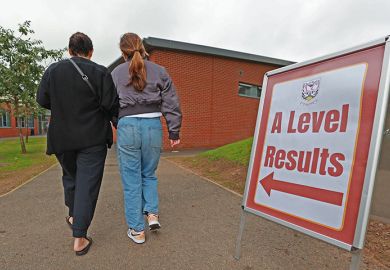UK universities are feeling the knock-on effect of a decline in the number of students taking English and mathematics at A level, raising fears for beleaguered departments in a time of intense competition for students.
The number of entries for English A levels fell by 13 per cent this year, and was down by 30 per cent since 2015. Entries for maths, which had been on the rise for the past three years, declined by 6 per cent.
This year’s A-level cohort in England was the first to go through reformed GCSEs in the subjects. The redesigned exams are intended to be more rigorous, but they have led to warnings that students were losing confidence in their abilities in these fields or were becoming more reluctant to take subjects perceived as being especially difficult.
There has been a knock-on effect on university admissions: Ucas data showed that, as of 23 August, the number of students placed UK-wide on courses classed as “linguistics, Classics and related” – which includes English studies – was down by 6.4 per cent year-on-year. Admissions have fallen by 19.5 per cent since 2015.
After years of growth, the number of students placed on maths degrees declined by 11 per cent in 2019.
Nick Hillman, director of the Higher Education Policy Institute, said the trends were “worrying”.
“Most people would accept that English and maths are particularly important areas of study,” he said. “There’s definitely a connection between A-level entries and the health of university departments. Just look at the challenges that language departments had to face after the catastrophic decision to make languages voluntary at GCSE, which led to drops at A levels and in higher education.”
Between 2007 and 2017, UK universities closed at least 10 modern language departments, and nine institutions significantly downsized their provision, according to the British Academy.
Robert Eaglestone, professor of contemporary literature and thought at Royal Holloway, University of London, said that the fall in the number of entrants in English “exacerbated the problem” for some departments that were already suffering from increased competition with rival institutions.
“One of the main reasons [for the decline] is the myth that English graduates have poor employability, especially compared with STEM; but in fact tech companies want students with the communication and insight skills that come with an English degree,” he said.
Several of the subjects reporting increased recruitment this year are in the sciences, such as medicine and dentistry (up 10.8 per cent) and biological sciences (up 2.8 per cent).
Mike Nicholson, director of student recruitment and admissions at the University of Bath, said that a drop in recruitment in maths and English could be a real problem for some institutions.
“English courses are a staple you can usually count on filling, but not if there are fewer applicants and fewer 18-year-olds overall,” he said.
Mr Nicholson highlighted that a maths A level was a requirement for a number of other degrees, such as computer science and engineering.
“Historically, we’re insurance to the University of Cambridge, the University of Warwick and Imperial College London, but this year we had a lower yield from insurance places than we anticipated. That would tie in with them being pressed on their maths numbers and therefore holding on to students who in previous years they would have let go of,” he said.
Ucas data show that a record number of students, 52,580, had been placed through clearing as of 23 August. This was up by 11 per cent year-on-year, and included 9,720 students who applied directly to clearing – 6.1 per cent more than last year.
Register to continue
Why register?
- Registration is free and only takes a moment
- Once registered, you can read 3 articles a month
- Sign up for our newsletter
Subscribe
Or subscribe for unlimited access to:
- Unlimited access to news, views, insights & reviews
- Digital editions
- Digital access to THE’s university and college rankings analysis
Already registered or a current subscriber?








